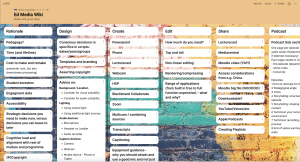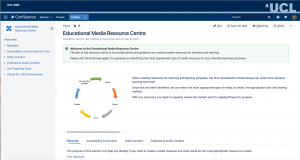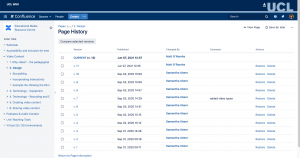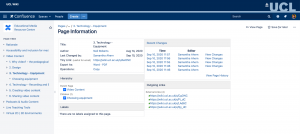At the start of the pandemic I was situated in the central Digital Education team as an Innovation and Development Officer. In that role I was working with colleagues from across Digital Education to prepare and support materials for colleagues across the university. In August 2020, I became a Faculty Learning Technology Lead (FLTL). In this role I am now in a position to support faculty colleagues in the selection and deployment of appropriate learning technologies. This includes supporting the development of staff digital capabilities and digital pedagogy.
Being situated within a faculty I now have a much better understanding of the processes involved, but also the pain points for staff and students. This enables me to respond more effectively but also tailor guidance for the specific needs of the faculty or individual departments.
Educational Media Resource Centre (EMRC)
 In March 2020 there was an emergency pivot to online teaching for the remainder of the 2019/20 academic year. The temporary operating model for the 2020/21 academic year was announced in June/July 2020. Term 1 would be online first delivery, with some onsite teaching at that time expected to happen in term 2. As the majority of colleagues were not involved in the emergency pivot, and it was no longer an emergency response, it was recognised that guidance would be needed on creating video-based learning resources. Learning technology focused colleagues had created and were creating a plethora of support resources for academic colleagues within their faculties. However, it was difficult to know what support was available and where it was located. In response to this need, I volunteered to lead on the development of a wiki-based resource. The aim of the wiki was to be a central resource that provided new guidance and directed users to relevant existing guidance, making it easier for users to find what they need and to reduce duplication of effort in producing guidance within faculty or department silos. I convened an initial group meeting and set-up a Padlet that was used to identify what the guide should cover and how it would be organised.
In March 2020 there was an emergency pivot to online teaching for the remainder of the 2019/20 academic year. The temporary operating model for the 2020/21 academic year was announced in June/July 2020. Term 1 would be online first delivery, with some onsite teaching at that time expected to happen in term 2. As the majority of colleagues were not involved in the emergency pivot, and it was no longer an emergency response, it was recognised that guidance would be needed on creating video-based learning resources. Learning technology focused colleagues had created and were creating a plethora of support resources for academic colleagues within their faculties. However, it was difficult to know what support was available and where it was located. In response to this need, I volunteered to lead on the development of a wiki-based resource. The aim of the wiki was to be a central resource that provided new guidance and directed users to relevant existing guidance, making it easier for users to find what they need and to reduce duplication of effort in producing guidance within faculty or department silos. I convened an initial group meeting and set-up a Padlet that was used to identify what the guide should cover and how it would be organised.



Confluence is the centrally supported wiki platform and is used to host Digital Education support materials and is managed by a different team within ISD. To avoid the EMRC content being lost in the existing support materials I requested a new wiki space and set-up the initial structure. I reached out to colleagues to crowd source the content. To make it easier for busy colleagues to contribute to the wiki, I created a series of pages to form the structure of the resource. Colleagues could then “drop” their content in the relevant section. I had previously made use of the Moodle wiki and attended Wikipedia editing workshops, but this project was my first experience using Confluence to create a wiki structure rather than just edit content. As I do not find the platform particularly intutitive there was some trial and error in adding the content and the layout tools used.
It is difficult to measure the impact that this resource has had regarding academic colleagues, However, for Learning Technologists across the institution it has increased the visibility of the materials available and provided a space for sharing learning. An example of this, is the addition of a section discussing Virtual 2D / 3D Environments which was added in May 2021.
During the 2020/21 academic year Students’ Union UCL published an open letter to the Provost and UCL’s Teaching Community expressing their gratitude for our response to the coronavirus pandemic and our commitment to delivering high quality teaching, recognising the technical skills development that was required in a short space of time.
Reflection
The end of the 2019/20 and the 2020/21 academic years were quite difficult, with shifting guidance and restrictions in place. It was a good idea to try to combine the guidance that had been generated into a one-stop-shop, however time constraints and competing demands meant that this was not possible in the way we initially envisioned. Although it was a difficult situation for all, it was possible to make some progress on this project. What I learnt was the need to encourage colleagues to contribute to strategic resources rather than focusing on immediate support needs and competing issues.
Discoverability of support materials is an ongoing issue. It has been recognised that although we have a lot of good content, it is hard to know what exists or how to find it. Some work has since been undertaken on mapping support materials to users’s needs at a range of levels from more general pedagogical queries to specific how-to questions.
Basic Hybrid and Connected Learning Sessions
In the early summer of 2021 it was announced that were appropriate UCL would offer a basic hybrid option to students for all or part of term 1 of the 2021/22 academic year. With all students expected to be in London for the start of term2 in early 2022. This was to enable students who were unable to travel due to Covid restrictions to continue with their studies without interrupting.
Delivering a session to those on campus and online simultaneously is difficult both technically and pedagogically. Colleagues in Digital Education and Arena had already created a number of guides and developed workshops. Therefore I focused on Aan area of specific concern for Faculty colleagues, student engagement. To address these concerns I designed and delivered a number of workshops, these were branded as the Connected Learning Sessions. Connected Learning is the phrase the institution has used to describe our pedagogic approach for the 2020/21 and 2021/22 academic years.
The two most relevant sessions were ‘Intentional Hospitality’ in November 2021, and ‘The what, why and how of student engagement’ in December 2021. Both sessions were advertised in the weekly faculty newsletter and all Connected Learning Leads were directly invited to the sessions via email.
Five colleagues attended the session in November, with the majority from outside the faculty. I had asked some fellow FLTLs and colleagues from Digital Education Advisory to attend to help facilitate the discussion as some quite difficult topics can be potentially be raised.
A Mentimeter presentation was created, however, as it was a small group the format was adjusted to a more relaxed group discussion. As the session was not recorded, this helped create a safe space for colleagues to share their thoughts and ideas. The session received positive feedback from those who attended.

As there were a number of key thinking points that would benefit other colleagues, I chose to create a follow-up blog post on the Digital Education blog.
The December session, ‘The what, why and how of student engagement’ also had 5 attendees. All from within the faculty. The main focus of the session was to consider what we mean by engagement, and to discuss different types of engagement. Colleagues were also asked to consider how these types of engagement could be demonstrated and about any difficulties they had in obtaining data about student engagement. My discussing and understanding faculty colleagues difficulties, I can then better support them but also have more constructive discussions with colleagues from Digital Educational and ISD more broadly.
This session was also well received by attendees, although one attendee did note that they were maybe not the right audience for the session as they are a programme lead, and it would be better suited to those teaching on the modules.
This session was recorded, and was shared as part of a blog post in the Bartlett Online Teaching Resource Hub Reflect site. The blog post was promoted via the weekly faculty newsletter. The recording is available to everyone within UCL and has so far received 10 views.
Reflection
Although the sessions haven’t been very well attended, those that have attended them have been quite positive about them and found them useful. I am hoping to re-run these sessions during the Summer of 2022 as part of a programme of workshops. A key issues during the pandemic has been students’ sense of belonging and more recently with hybrid teaching, the engagement of the remote participants and create a group dynamic in a hybrid cohort. The very human element of the learning experience. With the coming academic year (2022/23) and the focus shift to on campus delivery, creating a space for students and providing engagement opportunities within potentially larger groups becomes increasingly important. Some of this will be technical, but mostly it will be human factors. Sessions focusing on engagement and inclusion, in addition to more technical training such as Mentimeter will be important and are being planned.
An ongoing challenge is using connections witin the faculty to reach out to the different groups of colleagues who may benefit from different types of sessions. By becoming Chair of the faculty’s e-learning meeting and building relationships with the departmental leads, I am able to further develop these connections and by understanding of what is and isn’t working in departments. Through my interactions with these colleagues, I have developed a relationship of trust as they have asked for my opinion on things such as the design of assessments within a module, or for my opinion on which platform is the most suitable for a particular type of assessment. It has a taken a while, and some informal thinking spaces discussions with a Bloomsbury Learning Exchange colleague, for me to realise these are examples of leadership. Being a leader, and identifying how I lead, is something that is ongoing.
By embarking on the Professional Coaching Qualification Apprenticeship, my aim is to develop my skills in working with colleagues to better identify areas for improvement and development, and hopefully empowering colleagues to make changes in their own practice and development. But additionally, have a set of tools to unlock conversations within workshops to broader the discussion. Will help to continue my development as a leader.